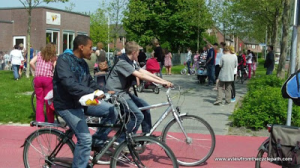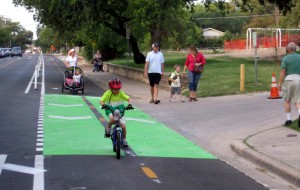
I am sure that, like me, many of you rode your bike to school every day. However, as we also all know that is an experience that has largely been denied NZers born after around 1985. The road and cycling environment changed so quickly that suddenly it was not considered safe for children to ride their bicycle. The bike sheds, where being late meant losing out on a space for your bike (and maybe propping it against a tree), became deserted and were often removed altogether.
A similar change has occurred in Australia. Some schools (like many in the United States) banned children riding to school altogether.The Netherlands has never lost this culture and perhaps that is just one reason why Dutch children are so happy (and slim). In fact, some towns like Gronigen have actually effectively stopped children being driven to school by banning cars stopping outside the school between 8am and 4pm. It is like another parallel universe for children – one where the independence and safety of children is paramount.

However, even in the United States, some communities have decided that they want to hand this experience and freedom back to their children. In Austin, Texas a separated, bi-directional cycle path has been installed to improve safety for cycling children. The cycle path is separated from traffic by plastic separators making it a cheap piece of infrastructure to install. This has led to the number of children cycling to grow from 2 to 40. Not bad if you consider that the rest of the cycle network around said path is likely to be still pretty limited.
NZ should do more to encourage children to walk, bike and take public transport to school. First, it creates more independent (and the Dutch and Danish situation suggests, happy) children. Second, we all see the difference in levels of traffic when schools are out (although the drop in traffic is estimated to be only 5%).
How much money could NZ save on new roads or expanding existing roads if that was a permanent situation? Isn’t this government meant to be fiscally conservative?



